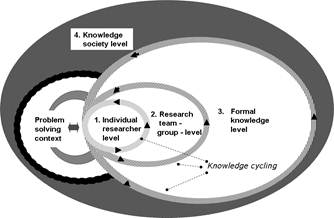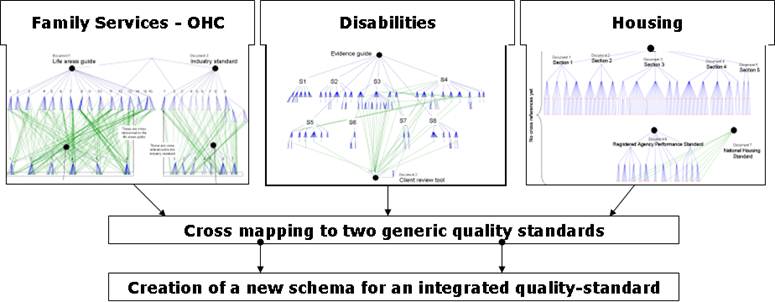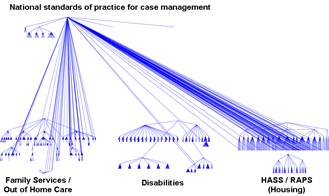Hi Richard,
You wrote:
You also said:
In the problem statement of any patent, we should be
able to tease out the interest being served, which is the subject of our
present discussions.
The language has subtly shifted here from “self-interest”
to “interest”. This represents a shift in the language even if the
context is about patents. This shift also relates to the challenges of
hierarchy as well. For example ,a research scientists
“self-interest” is quite different to a knowledge society’s
“interest” [and these represent different levels of hierarchy].
I am only saying that we are biting off
too large a chunk of reality to effectively model SOME aspect of self-interest.
Doug also mentioned that he believes “awareness” is required for self-interest,
though (if I remember the threads correctly) John felt that “awareness”
isn’t necessary. I kinda agree with John on that issue, but I
discuss it some more further below in this response.
Given this level of disagreement among us,
I think we need to severely limit the scope of our discussions. I offered
the patent specification example because it contains text that we can use to
ground our discussion. That doesn’t seem agreeable to John or you,
so perhaps that is just my own experience being served, and perhaps a different
example world would be better. I am open to other suggestions, but the
emphasis should be on SMALL worlds, LITTLE examples, and something of narrow
scope like the two Use Cases I suggested.
Unfortunately, those Use Cases don’t
seem to be well received either. We must keep looking for the small, easy
cases to discuss and reach some kind of partial consensus if we expect to get
very far with this. I am open to other suggestions, so long as they are
SMALL and we can get our intellectual arms around them.
Doug chose to use interest instead
of self-interest because (correct me if my assumption is wrong, Doug) he believes
that interest is more general. But the genetic evolutionary explanations I
keep hearing from biologists about how evolution works all seem to be based on self-interest, with examples like leaf cutter ants raising farms of fungus and
using other biota to keep the fungus growing on their leaf cuttings disease
free. The ants aren’t AWARE, IMHO, of their purpose in cutting
leaves, bringing them to the fungus farms, or applying antibiotic biota to keep
the infections down. They just do it like little automatons, unaware of
purpose, science or evolutionary explanations. So in my opinion, the kind
of explanations that evolutionary biologists use doesn’t allow for
awareness. That doesn’t mean human level actions aren’t aware
of their self-interest, just that there must be some distinction regarding how
aware the automaton is when performing actions that serve them.
For example, males and females act
differently in relating to each other, as related by the evolutionary biologists’
theories, because of subconscious drives to mate, raise kiddies, and populate
the available landscape. That explanation only allows some small degree
of awareness, but many of the actions we perform in that context are said to be
unconscious, therefore unaware.
Perhaps it is the awareness, and the self-
aspects of interest that most unite us as a group at this time. At least
we have all commented on it, if only to disagree in our interpretations. Can
we make progress there, and reach some conclusion about how the self- and
awareness issues relate to x–interest models in Doug’s microtheory?
Any progress would be useful in advancing the level of our discussions.
We need to reconnoiter at this point and
find a plan of progress we can mostly agree on to get further.
Thanks,
-Rich
Sincerely,
Rich Cooper
EnglishLogicKernel.com
Rich AT EnglishLogicKernel DOT com
9 4 9 \ 5 2 5 - 5 7 1 2
From:
ontolog-forum-bounces@xxxxxxxxxxxxxxxx
[mailto:ontolog-forum-bounces@xxxxxxxxxxxxxxxx] On Behalf Of Richard Vines
Sent: Saturday, August 27, 2011
3:49 PM
To: [ontolog-forum]
Subject: Re: [ontolog-forum] Partial interest ontology
Hi Rich,
You said:
1. Lets
use the scientific discovery process as a model, and try to limit the number of
distinctions to no more than three
2.
Perhaps instead we should consider
that limited class I suggested, and try to make progress elaborating
Doug’s formulation by experiment, observation or classification, but in a
more focused manner.
I am not sure if one
can explore the notion of an ontology of self-interest (perhaps even
self-interest as well) in this way. To draw this matter out …..
In any given context,
there are multiple levels of hierarchy involved –for example see below.

Figure 6 The hierarchical levels of
knowledge cycling in a research enterprise (source
here) from this
book.
You also said:
In the problem statement of any patent, we should be able to tease out
the interest
being served, which is the subject of our present discussions.
The language has
subtly shifted here from “self-interest” to “interest”.
This represents a shift in the language even if the context is about patents.
This shift also relates to the challenges of hierarchy as well. For example ,a
research scientists “self-interest” is quite different to a
knowledge society’s “interest” [and these represent different
levels of hierarchy].
Thus, I find myself
asking a question: can a notion of “self-interest” or
“interest” be represented as an ontology?
My sense is that there
is utility in understanding these types of matters as evolutionary processes
that cross over between ontology and epistemology. And that this in part involves processes of attempting to
resolve incommensurability.
John Sowa
says: If Richard or anybody else wants to use
the term 'incommensurable'
they should say what they are comparing, how they are
doing the comparisons, and what kinds of difficulties they have found.
In the text of the
book chapter related to the diagram above, distinctions are made between the
tacit, implicit and explicit schemas used by researchers involved in the
“scientific discovery process” with the schemas both adopted by the research team, and the
research organisation, as well as the more formal schemas (negotiated
standards) set by organisations such as national libraries or other national
and international standards bodies.
To respond to
John’s suggestion about what context I should use of the word
“incommensurable”, two examples of how comparisons are undertaken
and the sorts of difficulties that arise are:
(a) Creating commensurability
between different quality standards published as print documents. This challenge is manifest in the figure
below where three different quality standards are logically and semantically
structured in completely different ways as follows. The problem is that one
organisation can be delivering all these services. This in a nut shell is the
madness of regulatory burden with uncoordinated schemas across multiple service
systems. See report details here: Sections 3.2 and 3.3.
To resolve these problems of what I call incommensurability, an
additional level of hierarchy needs to be introduced to support semantic and
syntax mapping to allow for the emergence of a negotiated new schema.

(a) Creating commensurability
between different understanding of case management across different service
systems. See
report details here: See section 4.3
Here the problem is to do with the use of different (explicit,
tacit and implicit) social languages of case management in each of the
different service systems. Once again a different level of hierarchy is
introduced to help mediate the differences.

Figure 15. Cross-map using the
terms ‘case management, ‘case’, ‘management
(case)’
My question is whether
these types of evolutionary systems be contained within a notion of an ontology
of self-interest?
Is it in fact a
generalised ontology of self-interest that we are discussing? Or by suggesting
that we can only have a meaningful conversation about this topic by focusing on
a particular level of context (i.e. patent type context) are you implicitly
conceding that an ontology of self-interest is difficult to generalise about?
In which case are you
suggesting we cannot work from the “general” to the
“particular” when it comes to the topic of an ontology of
self-interest?
If you are, I would be
included to agree with you.
Cheers,
Richard


